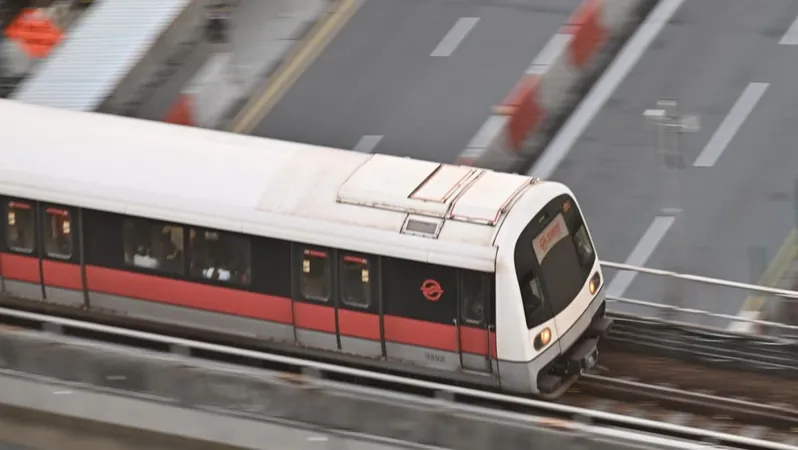
Enhancing Singapore’s Rail Reliability: Are Taxpayers and Commuters Prepared for the Cost?
2024-11-11
Author: Li
Introduction
In a recent parliamentary session, Transport Minister Chee Hong Tat addressed critical discussions surrounding the reliability of Singapore's rail transportation, specifically the current target of achieving 1 million mean kilometres between failure (MKBF). This benchmark, which was established five years ago, signifies the mean distance that trains can travel without operational disruptions and is deemed by Mr. Chee as both “relevant and valid” as the nation moves forward.
Parliamentary Discussions
The topic arose when Opposition Leader Pritam Singh questioned whether there are plans to enhance this threshold, possibly in light of persistent rail disruptions that have affected commuters in recent months. Minister Chee acknowledged that while it’s necessary to aim high, any potential increase in the MKBF would come at a price, one that would likely be absorbed by taxpayers or commuters.
“Raising the MKBF targets demands a careful evaluation of the associated costs,” Chee explained. “It’s imperative that we strike a balance between higher goals and the financial implications they carry.”
Recent Reliability Challenges
Recent months have indeed tested the reliability of Singapore’s Mass Rapid Transit (MRT) system, with notable incidents such as a major disruption that rendered the East-West Line inoperable for six days in September due to a faulty train. Another recent breakdown on the Bukit Panjang Light Rail Transit (LRT) led to service interruptions following a mechanical failure, highlighting the ongoing reliability challenges facing the system.
Commitment to Improvement
Despite these challenges, Chee announced improvements in the MKBF performance for MRT, positively shifting from approximately 1.8 million train-kilometres at the end of September to nearly 2 million by October's end. This demonstrates a commitment from the Ministry to not only uphold but exceed the existing reliability benchmarks.
Proactive Measures
In a proactive measure, Chee disclosed that SMRT is initiating a workgroup comprising Land Transport Authority (LTA) officials and representatives from the National Transport Workers’ Union to scrutinize existing systems and maintain practices. Collaborations with reliable international metro operators such as those in Guangzhou and Taipei are also planned, aimed at sharing best practices for improved reliability.
Modernization of Bukit Panjang LRT
The recent parliamentary dialogue also spotlighted the Bukit Panjang LRT’s modernization. MP Yeo Wan Ling inquired about the investigations into a specific incident that caused service disruptions, revealing initial findings of a gear failure that led to operational issues. The incident has sparked discussions about the need for greater attention to maintenance and operational standards.
Overhaul and Completion Delays
In the backdrop of these developments is the ongoing S$344 million (US$260 million) overhaul of the Bukit Panjang LRT system, which has been under scrutiny since its original installation was criticized for its unsuitability for the local topography. Initially slated for completion in 2024, the project has been delayed and is now expected to finish by 2026 due to pandemic-related setbacks.
Service Adjustments
In a bid to facilitate the upgrade, train services will see modified schedules, ending an hour earlier from November 14, 2024, to October 31, 2025, during weekends. Mr. Chee conveyed gratitude to commuters and residents for their patience as the renewal works progress, emphasizing their importance in resolving long-standing issues and ultimately enhancing service quality.
Conclusion
As Singapore envisions an even more reliable public transport system, the question remains: how much are taxpayers and commuters willing to pay for better efficiency? The debate continues, underscoring the delicate balance between ambition and affordability in public service projects.




 Brasil (PT)
Brasil (PT)
 Canada (EN)
Canada (EN)
 Chile (ES)
Chile (ES)
 España (ES)
España (ES)
 France (FR)
France (FR)
 Hong Kong (EN)
Hong Kong (EN)
 Italia (IT)
Italia (IT)
 日本 (JA)
日本 (JA)
 Magyarország (HU)
Magyarország (HU)
 Norge (NO)
Norge (NO)
 Polska (PL)
Polska (PL)
 Schweiz (DE)
Schweiz (DE)
 Singapore (EN)
Singapore (EN)
 Sverige (SV)
Sverige (SV)
 Suomi (FI)
Suomi (FI)
 Türkiye (TR)
Türkiye (TR)